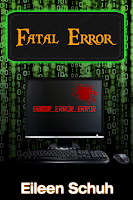 |
| Click to purchase |
This second book in the BackTracker series takes a look at how the characters deal with the social, emotional, and legal aftermath of their horrific year together with The Traz biker gang.
"So who's fault is it now, Sergeant Kindle? Who's to blame?" Katrina
asks herself at one point.
Sergeant Kindle, the man who oversaw the police operation and now must oversee the healing, feels compelled to defend his officers. “It
wasn't Shrug who murdered Lukas. That brutality wasn't his.”
Although he defends his men, Kindle knows that if Shrug refuses to accept responsibility, he won't begin healing. “Guilt is the downside of accepting blame,” he tells Shrug. “Being able to do something about what went wrong is the upside." His words do not sink in, though. Month's later he's after Shrug again. "So that's where you at?” he says. “You've
given up blaming the girl and into blaming me?"
Perhaps because she's so young, with so few coping skills and a life bereft of a support system, Katrina has the hardest time dealing with what went down.
“If you hadn’t....” a character tells her as she slogs
through her debilitating feelings of guilt and blame. Yes, way back when...if
she hadn’t. One error in judgement and someone died. “If I hadn’t...” she
thinks to herself. “If only I hadn’t...”
I address this question of guilt and blame in the discussion
guide for FATAL ERROR (available here as a pdf downloadable file ).
Here’s an excerpt from that guide:
Katrina was very young and grieving the loss of her parents
and grandparents when she took up life on the street. Kindle wants her to accept at least some of
the blame for what happened to her in The Traz biker compound. He believes she will not be able to recover
from the trauma until she does. However,
Shrug thinks forcing her to accept responsibility for what she did will make
her even more emotionally unstable.
- How responsible are we for what happens in our lives?
- At what age should we start taking the credit or blame for the results of our decisions and behaviours?
- If we don’t learn to accept responsibility, are we at risk of feeling helpless and victimized?
Questions:
- How do we know if we should take responsibility for bad things in our lives?
- Is taking responsibility for things the same as accepting blame for them?
- Can we accept responsibility and blame without being overcome by guilt, as Sergeant Kindle seems to do?
- Can we make our lives better even if we don’t accept the blame for the bad things that have happened to us?
- Shrug, Syd, Chad, and Sergeant Kindle all admitted responsibility, at least partially, for their roles in Katrina ending up in The Traz biker compound. Katrina and Rusty are reluctant to believe anything was their fault.Question:
- In FATAL ERROR, it appears that those accepting blame are able to move past the experience easier. Is that realistic?
Do these questions even have answers? My characters struggle to uncover the truth."Damn it, Sarge.” Shrug said. “Don't screw me up more. I had myself convinced I'd f*** you around."
"You did. But I let you. So, where does the blame lie? With me?”At one point, Shrug mutters, "There are many reasons things happen."
Katrina is keenly aware of the blame Shrug lays on her. "There are many reasons things happen,” she fights back.“And they don't all come back to me. I'm not the master cause of the universe."So, where does the blame lie? In Katrina’s one fatal error? In Shrug’s invitation to the girl to join him in the gang? In Kindle, who overlooked the fact Shrug had involved a child?Does the blame rest way back when before any of it happened...when those who could’ve got her off the street, didn’t? Or back to the drunk driver that killed her parents, and left her grieving and without guidance? Back to the child abuser who turned that driver into an alcoholic? Back... back.
So many in our prisons are themselves victims of violence. Many suffer head injuries that have disabled their judgement and inhibited their control over thinking and behaviour. Others are living with similar disabilities arising from their time way back in the womb when, despite the wee bodies and brains forming inside them, their mothers drank or used drugs.
A violent society, violent homelife. Injuries imposed by others . Addictions.
And then there are those who for their own sad reasons make a living from such human weaknesses.
So, now, Sergeant Kindle, who’s to blame?
___________________
FATAL ERROR on Amazon.com
 |
| FREE! Nov 10, 11 2012 |
FATAL ERROR eBook in the UK
FATAL ERROR paperback in the UK
___________________
www.eileenschuh.com
No comments:
Post a Comment